- Home
- Jack London
Northland Stories Page 28
Northland Stories Read online
Page 28
And then came a woman, queenly tall, crowned with a glory of hair that was like a golden sun. She seemed to come toward Jees Uck as a ripple of music across still water; her sweeping garment itself a song, her body playing rhythmically beneath. Jees Uck was herself a man compeller. There were Oche Ish and Imego and Hah Yo and Wy Nooch, to say nothing of Neil Bonner and John Thompson and other white men that had looked upon her and felt her power. But she gazed upon the wide blue eyes and rose-white skin of this woman that advanced to meet her, and she measured her with woman’s eyes looking through man’s eyes; and as a man compeller she felt herself diminish and grow insignificant before this radiant and flashing creature.
“You wish to see my husband?” the woman asked; and Jees Uck gasped at the liquid silver of a voice that had never sounded harsh cries at snarling wolf dogs, nor moulded itself to a guttural speech, nor toughened in storm and frost and camp smoke.
“No,” Jees Uck answered slowly and gropingly, in order that she might do justice to her English. “I come to see Neil Bonner.”
“He is my husband,” the woman laughed.
Then it was true! John Thompson had not lied that bleak February day, when she laughed pridefully and shut the door in his face. As once she had thrown Amos Pentley across her knee and ripped her knife into the air, so now she felt impelled to spring upon this woman and bear her back and down, and tear the life out of her fair body. But Jees Uck was thinking quickly and gave no sign, and Kitty Bonner little dreamed how intimately she had for an instant been related with sudden death.
Jees Uck nodded her head that she understood, and Kitty Bonner explained that Neil was expected at any moment. Then they sat down on ridiculously comfortable chairs, and Kitty sought to entertain her strange visitor, and Jees Uck strove to help her.
“You knew my husband in the North?” Kitty asked, once.
“Sure. I wash um clothes,” Jees Uck had answered, her English abruptly beginning to grow atrocious.
“And this is your boy? I have a little girl.”
Kitty caused her daughter to be brought, and while the children, after their manner, struck an acquaintance, the mothers indulged in the talk of mothers and drank tea from cups so fragile that Jees Uck feared lest hers should crumble to pieces between her fingers. Never had she seen such cups, so delicate and dainty. In her mind she compared them with the woman who poured the tea, and there uprose in contrast the gourds and pannikins of the Toyaat village and the clumsy mugs of Twenty Mile, to which she likened herself. And in such fashion and such terms the problem presented itself. She was beaten. There was a woman other than herself better fitted to bear and upbring Neil Bonner’s children. Just as his people exceeded her people, so did his women-kind exceed her. They were the man compellers, as their men were the world compellers. She looked at the rose-white tenderness of Kitty Bonner’s skin and remembered the sun-beat on her own face. Likewise she looked from brown hand to white—the one, workworn and hardened by whip handle and paddle, the other as guiltless of toil and soft as a newborn babe’s. And, for all the obvious softness and apparent weakness, Jees Uck looked into the blue eyes and saw the mastery she had seen in Neil Bonner’s eyes and in the eyes of Neil Bonner’s people.
“Why, it’s Jees Uck!” Neil Bonner said, when he entered. He said it calmly, with even a ring of joyful cordiality, coming over to her and shaking both her hands, but looking into her eyes with a worry in his own that she understood.
“Hello, Neil!” she said. “You look much good.”
“Fine, fine, Jees Uck,” he answered heartily, though secretly studying Kitty for some sign of what had passed between the two. Yet he knew his wife too well to expect, even though the worst had passed, such a sign.
“Well, I can’t say how glad I am to see you,” he went on. “What’s happened? Did you strike a mine? And when did you get in?”
“Oo-a, I get in to-day,” she replied, her voice instinctively seeking its guttural parts. “I no strike it, Neil. You know Cap’n Markheim, Unalaska? I cook, his house, long time. No spend money. Bime-by, plenty. Pretty good, I think, go down and see White Man’s Land. Very fine, White Man’s Land, very fine,” she added. Her English puzzled him, for Sandy and he had sought, constantly, to better her speech, and she had proved an apt pupil. Now it seemed that she had sunk back into her race. Her face was guileless, stolidly guileless, giving no cue. Kitty’s untroubled brow likewise baffled him. What had happened? How much had been said? and how much guessed?
While he wrestled with these questions and while Jees Uck wrestled with her problem—never had he looked so wonderful and great—a silence fell.
“To think that you knew my husband in Alaska!” Kitty said softly.
Knew him! Jees Uck could not forbear a glance at the boy she had borne him, and his eyes followed hers mechanically to the window where played the two children. An iron band seemed to tighten across his forehead. His knees went weak and his heart leaped up and pounded like a fist against his breast. His boy! He had never dreamed it!
Little Kitty Bonner, fairylike in gauzy lawn, with pinkest of cheeks and bluest of dancing eyes, arms outstretched and lips puckered in invitation, was striving to kiss the boy. And the boy, lean and lithe, sunbeaten and browned, skin-clad and in hair-fringed and hair-tufted muclucs that showed the wear of the sea and rough work, coolly withstood her advances, his body straight and stiff with the peculiar erectness common to children of savage people. A stranger in a strange land, unabashed and unafraid, he appeared more like an untamed animal, silent and watchful, his black eyes flashing from face to face, quiet so long as quiet endured, but prepared to spring and fight and tear and scratch for life, at the first sign of danger.
The contrast between boy and girl was striking, but not pitiful. There was too much strength in the boy for that, waif that he was of the generations of Shpack, Spike O’Brien, and Bonner. In his features, clean cut as a cameo and almost classic in their severity, there were the power and achievement of his father, and his grandfather, and the one known as the Big Fat, who was captured by the Sea People and escaped to Kamchatka.
Neil Bonner fought his emotion down, swallowed it down, and choked over it, though his face smiled with good humor and the joy with which one meets a friend.
“Your boy, eh, Jees Uck?” he said. And then turning to Kitty: “Handsome fellow! He ’ll do something with those two hands of his in this our world.”
Kitty nodded concurrence. “What is your name?” she asked.
The young savage flashed his quick eyes upon her and dwelt over her for a space, seeking out, as it were, the motive beneath the question.
“Neil,” he answered deliberately when the scrutiny had satisfied him.
“Injun talk,” Jees Uck interposed, glibly manufacturing languages on the spur of the moment. “Him Injun talk, nee-al, all the same ‘cracker.’ Him baby, him like cracker; him cry for cracker. Him say, ‘Nee-al, nee-al,’ all time him say, ‘Nee-al.’ Then I say that um name. So um name all time Nee-al.”
Never did sound more blessed fall upon Neil Bonner’s ear than that lie from Jees Uck’s lips. It was the cue, and he knew there was reason for Kitty’s untroubled brow.
“And his father?” Kitty asked. “He must be a fine man.”
“Oo-a, yes,” was the reply. “Um father fine man. Sure!”
“Did you know him, Neil?” queried Kitty.
“Know him? Most intimately,” Neil answered, and harked back to dreary Twenty Mile and the man alone in the silence with his thoughts.
And here might well end the story of Jees Uck, but for the crown she put upon her renunciation. When she returned to the North to dwell in her grand log-house, John Thompson found that the P. C. Company could make a shift somehow to carry on its business without his aid. Also, the new agent and the succeeding agents received instructions that the woman Jees Uck should be given whatsoever goods and grub she desired, in whatsoever quantities she ordered, and that no charge should be placed upon the books.
Further, the company paid yearly to the woman Jees Uck a pension of five thousand dollars.
When he had attained suitable age, Father Champreau laid hands upon the boy, and the time was not long when Jees Uck received letters regularly from the Jesuit college in Maryland. Later on these letters came from Italy, and still later from France. And in the end there returned to Alaska one Father Neil, a man mighty for good in the land, who loved his mother and who ultimately went into a wider field and rose to high authority in the order.
Jees Uck was a young woman when she went back into the North, and men still looked upon her and yearned. But she lived straight, and no breath was ever raised save in commendation. She stayed for a while with the good sisters at Holy Cross, where she learned to read and write and became versed in practical medicine and surgery. After that she returned to her grand log-house and gathered about her the young girls of the Toyaat village, to show them the way of their feet in the world. It is neither Protestant nor Catholic, this school in the house built by Neil Bonner for Jees Uck, his wife; but the missionaries of all the sects look upon it with equal favor. The latchstring is always out, and tired prospectors and trail-weary men turn aside from the flowing river or frozen trail to rest there for a space and be warm by her fire. And, down in the States, Kitty Bonner is pleased at the interest her husband takes in Alaskan education and the large sums he devotes to that purpose; and, though she often smiles and chaffs, deep down and secretly she is but the prouder of him.
Love of Life
“This out of all will remain—
They have lived and have tossed:
So much of the game will be gain,
Though the gold of the dice has been lost.”
They limped painfully down the bank, and once the foremost of the two men staggered among the rough-strewn rocks. They were tired and weak, and their faces had the drawn expression of patience which comes of hardship long endured. They were heavily burdened with blanket packs which were strapped to their shoulders. Head-straps, passing across the forehead, helped support these packs. Each man carried a rifle. They walked in a stooped posture, the shoulders well forward, the head still farther forward, the eyes bent upon the ground.
“I wish we had just about two of them cartridges that ’s layin’ in that cache of ourn,” said the second man.
His voice was utterly and drearily expressionless. He spoke without enthusiasm; and the first man, limping into the milky stream that foamed over the rocks, vouchsafed no reply.
The other man followed at his heels. They did not remove their foot-gear, though the water was icy cold—so cold that their ankles ached and their feet went numb. In places the water dashed against their knees, and both men staggered for footing.
The man who followed slipped on a smooth boulder, nearly fell, but recovered himself with a violent effort, at the same time uttering a sharp exclamation of pain. He seemed faint and dizzy and put out his free hand while he reeled, as though seeking support against the air. When he had steadied himself he stepped forward, but reeled again and nearly fell. Then he stood still and looked at the other man, who had never turned his head.
The man stood still for fully a minute, as though debating with himself. Then he called out:
“I say, Bill, I ’ve sprained my ankle.”
Bill staggered on through the milky water. He did not look around. The man watched him go, and though his face was expressionless as ever, his eyes were like the eyes of a wounded deer.
The other man limped up the farther bank and continued straight on without looking back. The man in the stream watched him. His lips trembled a little, so that the rough thatch of brown hair which covered them was visibly agitated. His tongue even strayed out to moisten them.
“Bill!” he cried out.
It was the pleading cry of a strong man in distress, but Bill’s head did not turn. The man watched him go, limping grotesquely and lurching forward with stammering gait up the slow slope toward the soft sky-line of the low-lying hill. He watched him go till he passed over the crest and disappeared. Then he turned his gaze and slowly took in the circle of the world that remained to him now that Bill was gone.
Near the horizon the sun was smouldering dimly, almost obscured by formless mists and vapors, which gave an impression of mass and density without outline or tangibility. The man pulled out his watch, the while resting his weight on one leg. It was four o’clock, and as the season was near the last of July or first of August,—he did not know the precise date within a week or two,—he knew that the sun roughly marked the northwest. He looked to the south and knew that somewhere beyond those bleak hills lay the Great Bear Lake; also, he knew that in that direction the Arctic Circle cut its forbidding way across the Canadian Barrens. This stream in which he stood was a feeder to the Coppermine River, which in turn flowed north and emptied into Coronation Gulf and the Arctic Ocean. He had never been there, but he had seen it, once, on a Hudson Bay Company chart.
Again his gaze completed the circle of the world about him. It was not a heartening spectacle. Everywhere was soft sky-line. The hills were all low-lying. There were no trees, no shrubs, no grasses—naught but a tremendous and terrible desolation that sent fear swiftly dawning into his eyes.
“Bill!” he whispered, once and twice; “Bill!”
He cowered in the midst of the milky water, as though the vastness were pressing in upon him with overwhelming force, brutally crushing him with its complacent awfulness. He began to shake as with an ague-fit, till the gun fell from his hand with a splash. This served to rouse him. He fought with his fear and pulled himself together, groping in the water and recovering the weapon. He hitched his pack farther over on his left shoulder, so as to take a portion of its weight from off the injured ankle. Then he proceeded, slowly and carefully, wincing with pain, to the bank.
He did not stop. With a desperation that was madness, unmindful of the pain, he hurried up the slope to the crest of the hill over which his comrade had disappeared—more grotesque and comical by far than that limping, jerking comrade. But at the crest he saw a shallow valley, empty of life. He fought with his fear again, overcame it, hitched the pack still farther over on his left shoulder, and lurched on down the slope.
The bottom of the valley was soggy with water, which the thick moss held, spongelike, close to the surface. This water squirted out from under his feet at every step, and each time he lifted a foot the action culminated in a sucking sound as the wet moss reluctantly released its grip. He picked his way from muskeg to muskeg, and followed the other man’s footsteps along and across the rocky ledges which thrust like islets through the sea of moss.
Though alone, he was not lost. Farther on he knew he would come to where dead spruce and fir, very small and weazened, bordered the shore of a little lake, the titchin-nichilie, in the tongue of the country, the “land of little sticks.” And into that lake flowed a small stream, the water of which was not milky. There was rush-grass on that stream—this he remembered well—but no timber, and he would follow it till its first trickle ceased at a divide. He would cross this divide to the first trickle of another stream, flowing to the west, which he would follow until it emptied into the river Dease, and here he would find a cache under an upturned canoe and piled over with many rocks. And in this cache would be ammunition for his empty gun, fish-hooks and lines, a small net—all the utilities for the killing and snaring of food. Also, he would find flour,—not much,—a piece of bacon, and some beans.
Bill would be waiting for him there, and they would paddle away south down the Dease to the Great Bear Lake. And south across the lake they would go, ever south, till they gained the Mackenzie. And south, still south, they would go, while the winter raced vainly after them, and the ice formed in the eddies, and the days grew chill and crisp, south to some warm Hudson Bay Company post, where timber grew tall and generous and there was grub without end.
These were the thoughts of the man as he strove onward. But hard as he strove with h
is body, he strove equally hard with his mind, trying to think that Bill had not deserted him, that Bill would surely wait for him at the cache. He was compelled to think this thought, or else there would not be any use to strive, and he would have lain down and died. And as the dim ball of the sun sank slowly into the northwest he covered every Inch—and many times—of his and Bill’s flight south before the downcoming winter. And he conned the grub of the cache and the grub of the Hudson Bay Company post over and over again. He had not eaten for two days; for a far longer time he had not had all he wanted to eat. Often he stooped and picked pale muskeg berries, put them into his mouth, and chewed and swallowed them. A muskeg berry is a bit of seed enclosed in a bit of water. In the mouth the water melts away and the seed chews sharp and bitter. The man knew there was no nourishment in the berries, but he chewed them patiently with a hope greater than knowledge and defying experience.
At nine o’clock he stubbed his toe on a rocky ledge, and from sheer weariness and weakness staggered and fell. He lay for some time, without movement, on his side. Then he slipped out of the pack-straps and clumsily dragged himself into a sitting posture. It was not yet dark, and in the lingering twilight he groped about among the rocks for shreds of dry moss. When he had gathered a heap he built a fire,—a smouldering, smudgy fire,—and put a tin pot of water on to boil.
He unwrapped his pack and the first thing he did was to count his matches. There were sixty-seven. He counted them three times to make sure. He divided them into several portions, wrapping them in oil paper, disposing of one bunch in his empty tobacco pouch, of another bunch in the inside band of his battered hat, of a third bunch under his shirt on the chest. This accomplished, a panic came upon him, and he unwrapped them all and counted them again. There were still sixty-seven.

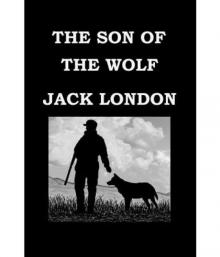 The Son of the Wolf
The Son of the Wolf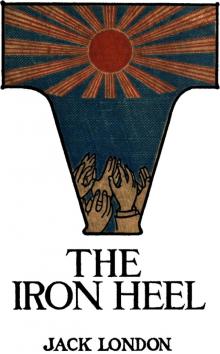 The Iron Heel
The Iron Heel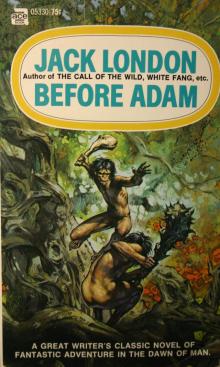 Before Adam
Before Adam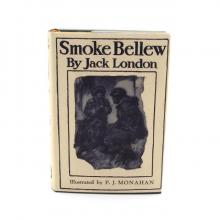 Smoke Bellew
Smoke Bellew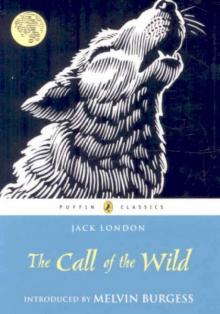 The Call of the Wild
The Call of the Wild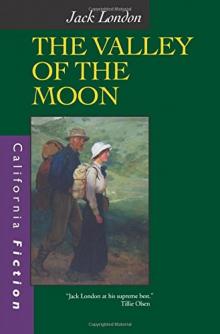 The Valley of the Moon Jack London
The Valley of the Moon Jack London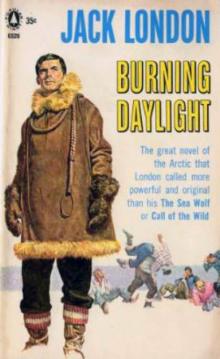 Burning Daylight
Burning Daylight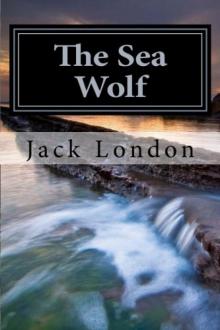 The Sea Wolf
The Sea Wolf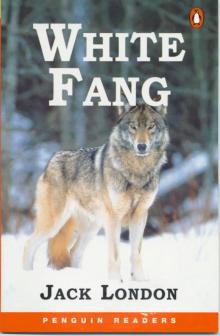 White Fang
White Fang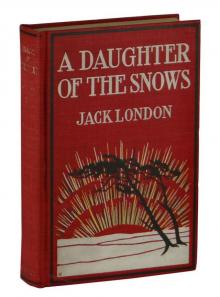 A Daughter of the Snows
A Daughter of the Snows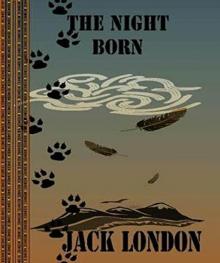 The Night-Born
The Night-Born A Son Of The Sun
A Son Of The Sun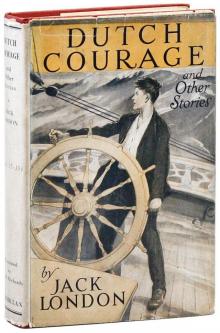 Dutch Courage and Other Stories
Dutch Courage and Other Stories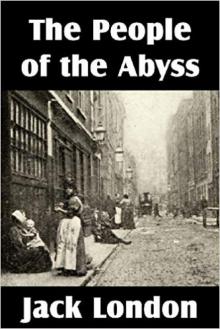 The People of the Abyss
The People of the Abyss Michael, Brother of Jerry
Michael, Brother of Jerry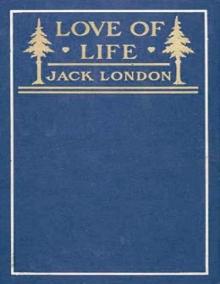 Love of Life, and Other Stories
Love of Life, and Other Stories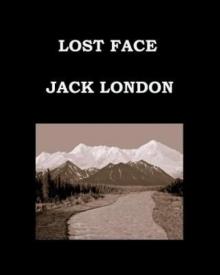 Lost Face
Lost Face The Road
The Road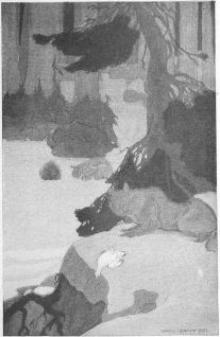 Love of Life
Love of Life The Turtles of Tasman
The Turtles of Tasman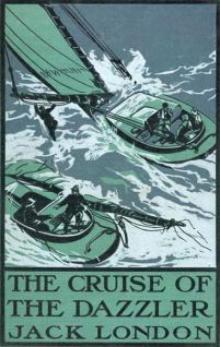 The Cruise of The Dazzler
The Cruise of The Dazzler The Heathen
The Heathen The Scab
The Scab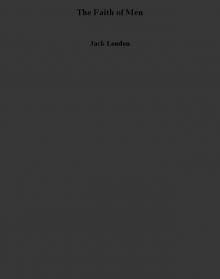 The Faith of Men
The Faith of Men Adventure
Adventure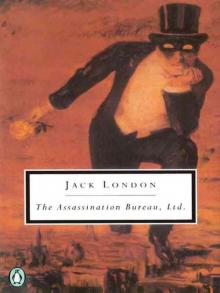 The Assassination Bureau, Ltd.
The Assassination Bureau, Ltd.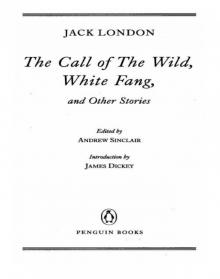 The Call of the Wild, White Fang, and Other Stories
The Call of the Wild, White Fang, and Other Stories The Call of the Wild and Selected Stories
The Call of the Wild and Selected Stories Jerry of the Islands
Jerry of the Islands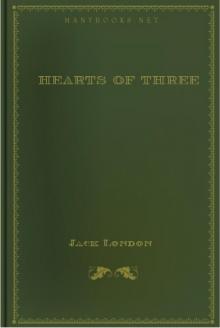 Hearts of Three
Hearts of Three The House of Pride
The House of Pride Moon-Face and Other Stories
Moon-Face and Other Stories Children of the Frost
Children of the Frost South Sea Tales
South Sea Tales The Strength of the Strong
The Strength of the Strong The Jacket (The Star-Rover)
The Jacket (The Star-Rover) The Little Lady of the Big House
The Little Lady of the Big House John Barleycorn
John Barleycorn ADaugter of Snows
ADaugter of Snows The Mutiny of the Elsinore
The Mutiny of the Elsinore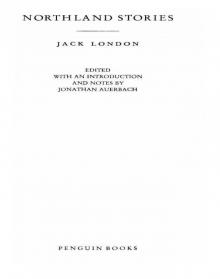 Northland Stories
Northland Stories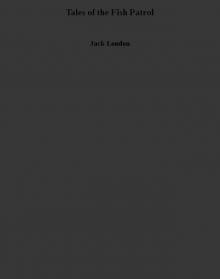 Tales of the Fish Patrol
Tales of the Fish Patrol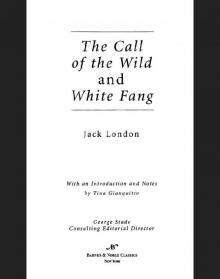 Call of the Wild and White Fang (Barnes & Noble Classics Series)
Call of the Wild and White Fang (Barnes & Noble Classics Series) The Valley of the Moon
The Valley of the Moon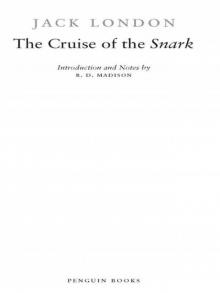 The Cruise of the Snark
The Cruise of the Snark The Game
The Game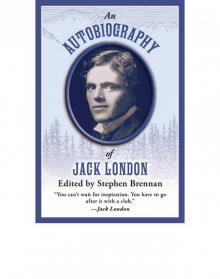 An Autobiography of Jack London
An Autobiography of Jack London